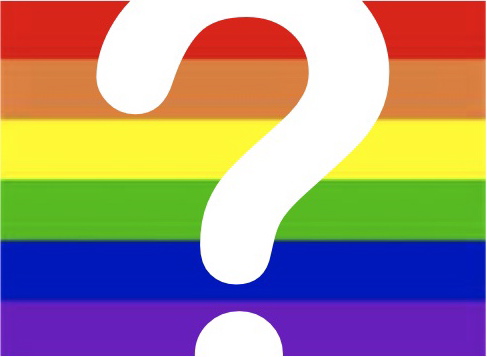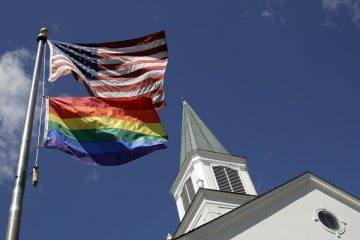Homosexuality. What Is The Proper Christian Response?
Fewer topics are more divisive within Christian communities than homosexuality. It is a volatile issue, splitting and dividing denominations and those who comprise them. Most church leaders would just as soon ignore the issue than take it head-on. Those that do, however, tend to fall into two camps.
On the extreme right, there are folks like Fred Phelps who broadcast the message, “God hates fags.” (It’s painful to even write those words.)
On the opposite side of the spectrum, denominations like the Episcopal Church USA proudly ordain openly gay men like Gene Robinson.
Talk about polarizing!
Consequently, our lack of clarity has only weakened the Church’s moral voice. And in most cases Christians have lost the right to be heard by the gay community, which is tragic.
It is tragic because the Christian message is primarily one of human flourishing, hope, restoration, and redemption.
- It upends the curse of the fall, rescuing humanity from the slavery of sin and death.
- It restores relationships and maintains social order.
- It is the pathway toward true forgiveness.
- It sets in motion a healing process that will one day culminate in the believer’s perfection.
- It enables us to understand the world as it really is.
- It provides substantive hope for a suffering world.
- And it frees the soul to truly live.
Yet that message can’t get through in part because the Church can’t seem to get on the same page.
I believe an authentic expression of Christ compels followers to embrace the tensions of both extremes: indignation on the one hand and acceptance on the other.
Each contains a grain of truth, but both are encumbered with a ton of baggage. Somehow we have to find a way to hit the sweet spot — that delicate balance of honoring truth with grace.
I also believe homosexuality is the most important social issue facing the church in North America. The reason is because this community is perhaps the hardest to love.
It takes a truck-load of prayer, patience, discipline, and self-examination to represent God well to gay individuals. We all carry emotional baggage, which means that before we can begin to deal with other people’s junk we must first deal with out own. Such maturity requires an awful lot of personal growth and development. But if we can learn to responsibly minister to gay individuals, I am convinced it will dramatically improve our overall witness.
So the ten million dollar question is “How should Christians respond to gay individuals in a way that honors both them and biblical truth so that we can earn the right to be heard?”
I have a few thoughts on the matter, but I’ll share them in another post. In the meantime, I welcome your thoughts on what I’ve raised so far.
1. What do you agree or disagree with concerning my comments thus far?
2. Why, in your opinion, is it so hard to represent God well to gay individuals?




6 Comments
Gloria · May 24, 2013 at 10:07 pm
I agree with your thoughts Brian and am looking forward to the next post! One reason that it is hard to represent God well is that a gay or lesbian person believes their sexual preference IS their identity. So, when anyone talks about their behavior as being wrong or a sin, we are talking about THEM not being a good person, not being worthy, etc. and they have put up with a lot of self-hate and condemnation — (this is attributed to Michael Ramsden – RZIM) — So, we have to love them and point to Christ in ways that allows them to figure out the grace and mercy of Jesus and allows them to confront what might not be pleasing to God in their lives (just like anyone else – adulterers, those who live together before marriage, etc.) — – that takes time and agape love – and the Holy Spirit to guide!
Brian · May 25, 2013 at 8:28 am
Agreed. Identity is not based upon sexuality. Gender yes. But not sexuality. Yet this appears to be the case for many within the gay community. (I hesitate to make this exclusively true for every gay individual because there are always exceptions, but as a general rule I believe this is more often the case than not.) If Christians are to have an effective outreach to gay individuals, it is key that we understand how from their point of view their sexuality is indistinguishable from their identity. This is the reason why the cliche “love the sinner, hate the sin” is incomprehensible. It makes perfect sense for us, but nonsense to them. If we’re to have anything resembling authentic community we first need to understand each other.
Thanks for responding, Gloria! I appreciate your comments. They are helpful.
Cecil · May 24, 2013 at 10:09 pm
Hey Brian,
Interesting post. I am myself a gay man but grew up in the church and went to a well respected bible school known for training its graduates for ministry. I believe that God still has a hold on my life, even though I have been living in rebellion to his word and his will for the past year.
I am trying to figure out where I stand on where the church has it wrong when it comes to ministering to the LGBT community. I think you are right when you say “in most cases Christians have lost the right to be heard by the gay community, which is tragic.” It really is tragic. Many of my gay friends hear the words church or God and cringe. They see the church as a hateful and ignorant. It hurts because I still consider myself a Christian, I am going to a bible believing Southern Baptist church. When my friends are asking me about Sunday Funday Bloody Mary’s and I have to tell them I’m going to church I sense so much confusion on their end. The church is an organization that has hurt, ostracized, abused, and condemned them. They wonder why I would put myself through that kind of self torture?
I think it comes down to the Church being a community that loves and offers grace with Truth. My pastor has been the one person in the church who has given me all three together. I know he loves me and cares about me, but he doesn’t shy away from the truth that’s in the Bible. It is because of men and women in my small church that I have continued to struggle with God and with his word in relation to my homosexuality. The love (the commitment to me as a person, investing in me, listening to me, crying with me, being angry with me), the grace (knowing that I’m human and struggle constantly to understand God’s plan for my life, and not judging me for it), and the Truth (sharing God’s redeeming, healing, restoring, hope-giving love through his Scripture).
It’s a commitment to all three of these things that has kept me from leaving and spitting on the church like so many of my friends. I am thankful to God for bringing me to that church and showing me that real ministry does exist to people who struggle with Homosexuality.
I want to know what you mean by “The reason is because this community is perhaps the hardest to love.”
Brian · May 25, 2013 at 9:22 am
I really appreciate your honesty, Cecil. I’ve read your post several times. It sounds like your pastor really gets it. I’m so glad to hear you found a good church – one that hasn’t continued to push you further away. And I agree 100% with you when you write that love, grace, and truth must all come together.
One of the unsettling discoveries I’ve made recently is how little I understand God’s grace and love. Unfortunately, I’m afraid that most Christians in North America would find themselves making a similar confession if they were honest. (I limit it to North America because that has been my primary context, but I’m pretty certain this struggle is not limited to culture or historical context.) We can only give love and grace to the extent that we have received it from God. Consequently, we tend to fall pretty quickly into legalism. I think you would agree wholeheartedly that such a mindset is lethal, especially when we impose that upon gay individuals. The challenge for the Church with respect to the gay community is that because we fail to grasp the depth of God’s love and grace we are subsequently incapable of giving it to the level it needs to be given in order to truly be helpful to gay individuals. It is easy to love people who are lovable. But it is a greater challenge to love a community of people who in many cases are angry, vindictive, proud, and intolerant. I think of Dan Savage as the paradigmatic example here. His conduct is abhorrent. He’s just as hypocritical and judgmental as the Christians he rages against. So, yeah, it’s gonna be harder to love someone as broken as Dan. Like I mentioned in the post above, we all carry emotional baggage. And it so happens that the emotional baggage of the Christian and gay communities are ripe for a natural clash. Somebody has to show themselves the bigger. I believe it needs to start with Christ’s representatives.
Hopefully that helps to more fully develop what I meant by my statement, “The reason is because this community is perhaps the hardest to love.”
Again, I very much appreciate your comments. Thanks for taking the time to read and respond.
Askme · May 25, 2013 at 10:32 pm
Oh my goodness! This is spot on! Here’s my thoughts on how to be heard:
http://askthebigot.com/2012/09/03/why-do-you-hate-gays/
Homosexuality: The Proper Christian Response! | right lane reflections · June 4, 2013 at 8:46 pm
[…] ← Homosexuality. What Is The Proper Christian Response? […]